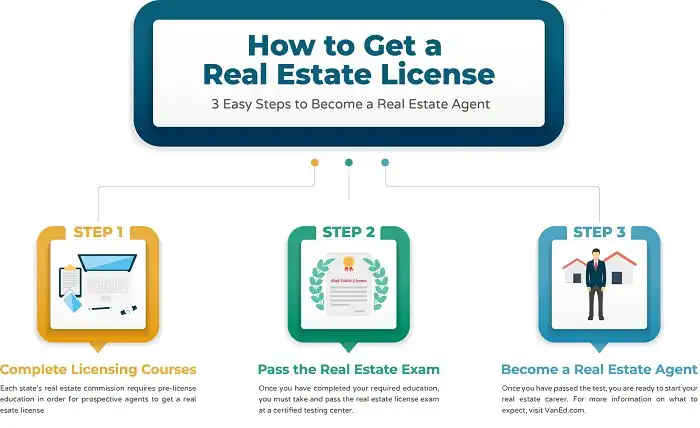How to Get a Real Estate License in 2023

A real estate license is a credential that allows you to legally represent buyers or sellers in real estate transactions. A real estate license can also help you advance your career, income, and skills in the real estate industry. However, getting a real estate license can also be a challenging and time-consuming process, as it requires education, examination, and application.
If you are interested in getting a real estate license in 2023, you need to follow the rules and regulations of your state or jurisdiction. You also need to use the right resources and tools to help you with your preparation and application. In this blog post, I will provide you with a general overview of how to get a real estate license in 2023.
Step 1: Meet the Eligibility Requirements
The first step of getting a real estate license is to meet the eligibility requirements of your state or jurisdiction. These requirements may vary depending on the type and level of license that you want to obtain. However, some of the common eligibility requirements are:
- Age: You must be at least 18 years old (or 19 in some states) to apply for a real estate license.
- Education: You must have a high school diploma or equivalent to apply for a real estate license.
- Citizenship: You must be a US citizen or a legal resident to apply for a real estate license.
- Background: You must have a clean criminal record and no disciplinary actions or complaints against you to apply for a real estate license.
Step 2: Complete the Pre-Licensing Education
The second step of getting a real estate license is to complete the pre-licensing education of your state or jurisdiction. This education consists of courses that cover the basic principles and practices of real estate, such as law, ethics, finance, marketing, appraisal, or contracts. The number and duration of courses may vary depending on the type and level of license that you want to obtain. However, some of the common pre-licensing education requirements are:
- Hours: You must complete a minimum number of hours of pre-licensing education to apply for a real estate license. The number of hours may range from 40 to 180 hours, depending on the state or jurisdiction.
- Provider: You must complete your pre-licensing education from an approved provider or school to apply for a real estate license. You can find a list of approved providers or schools from your state’s real estate commission or department website.
- Format: You can complete your pre-licensing education in various formats, such as online, classroom, or self-study, depending on your preference and availability. However, you must ensure that your chosen format meets the standards and requirements of your state or jurisdiction.
Step 3: Pass the Licensing Exam
The third step of getting a real estate license is to pass the licensing exam of your state or jurisdiction. This exam tests your knowledge and understanding of the topics that you learned in your pre-licensing education. The format and content of the exam may vary depending on the type and level of license that you want to obtain. However, some of the common licensing exam characteristics are:
- Fee: You must pay a fee to register and take the licensing exam. The fee may range from $50 to $150, depending on the state or jurisdiction.
- Location: You must take the licensing exam at an authorized testing center or location. You can find a list of authorized testing centers or locations from your state’s real estate commission or department website.
- Structure: The licensing exam consists of two sections: a national section and a state-specific section. The national section covers general topics that are applicable to all states, such as law, ethics, finance, marketing, appraisal, or contracts. The state-specific section covers topics that are specific to your state or jurisdiction, such as local laws, regulations, customs, or practices.
- Duration: The licensing exam has a time limit that you must complete within. The time limit may range from 2 to 4 hours, depending on the state or jurisdiction.
- Score: The licensing exam has a passing score that you must achieve or exceed. The passing score may range from 60% to 75%, depending on the state or jurisdiction.
Step 4: Apply for the License
The final step of getting a real estate license is to apply for the license with your state’s real estate commission or department. You need to submit your application and documents that prove your eligibility, education, and examination. You also need to pay a fee and undergo a background check and fingerprinting. Some of the documents and steps that you need to submit and complete are:
- Application form: You need to fill out and sign an application form that contains your personal and professional information. You can find the application form from your state’s real estate commission or department website.
- Certificate of completion: You need to provide a certificate of completion that shows that you have completed your pre-licensing education from an approved provider or school. You can obtain the certificate of completion from your provider or school.
- Exam results: You need to provide your exam results that show that you have passed your licensing exam. You can obtain your exam results from the testing center or location where you took the exam.
- Fee: You need to pay a fee to apply for the license. The fee may range from $100 to $300, depending on the state or jurisdiction.
- Background check and fingerprinting: You need to undergo a background check and fingerprinting to verify your identity and criminal history. You can find the instructions and locations for the background check and fingerprinting from your state’s real estate commission or department website.
Conclusion
A real estate license is a credential that allows you to legally represent buyers or sellers in real estate transactions. A real estate license can also help you advance your career, income, and skills in the real estate industry. However, getting a real estate license can also be a challenging and time-consuming process, as it requires education, examination, and application.



